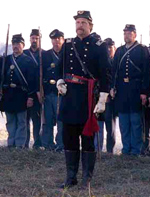It’s a story of the generals of the Civil War, if all the generals had the same acting coach as the “Dawson’s Creek” stars with none of their hip clothing.
It’s 1861 and the sparks that start the fire of the Civil War are just catching.
In Virginia, loyal statesmen are rallying to the cause of the South. Lincoln has sent a letter to the Southern generals demanding they help crush the burgeoning secessionist rebellion.
Instead, they prepare to go to war against the North.
Loving husband and southern General “Stonewall” Jackson (Stephen Lang, “Fire Down Below”), devoted northern schoolteacher Tom Chamberlain (C. Thomas Howell, “Separate Ways”) and other soldiers, bid their families farewell in long, poorly acted scenes.
The movie then continues for three hours and fifty minutes, following the generals and a few select characters through several battles.
“Gods and Generals” is a long, ponderous movie with a terrible script and even worse acting.
Very little happens throughout the movie, yet scenes between characters still somehow manage to drag on for half an hour.
Battle scenes, in which we see very little except marching soldiers, stretch on with no action for most of the movie.
“Gods and Generals” is based on the novel written by Jeff Shaara.
Ronald F. Maxwell, the director of “Gettysburg,” wrote and directed.
As a sequel to “Gettysburg,” which some consider one of the greatest war movies in all of film, “Gods and Generals” is a complete letdown.
The movie also attempts to avoid the issue of slavery as much as possible.
Throughout the entire movie there are only two black characters, both of whom are entirely devoted to their masters.
The movie tries to portray the Civil War as a war about states’ rights, not slavery, and in effect comes off as racist.
Despite the long battle scenes, some of the better parts of the movie take place within them.
The realistic sound of bullets whizzing overhead underscores most of the generals’ speeches on the battlefield.
The audience witnesses the bravery of the men and of the generals as they ride into battle, usually as much in the fray as the troops.
In a true display of the devastation of the war, after the Battle of Fredericksburg, the camera pans to show a field littered with bodies.
The shot then cuts to later that night, when the soldiers must cover themselves with the fallen bodies of their comrades to avoid being shot.
There is a touching scene during a battle when battalions of Irish soldiers from both sides realize that they are fighting against their own countrymen.
“Don’t they know we are fighting for our freedom?” cries one Southern soldier. Another solider lays his head in his arms and weeps.
Then there is the battle of Chancellorsville.
Thousands of soldiers run through the opposing side’s campsite at mid-morning, surprising the soldiers into a retreat.
For once, the suspense and climax build. It is one of the few exciting parts of the movie.
Part of the problem lies in the speech of the generals.
The script seems to be trying to take the same bravado language the generals and other characters wrote in and turn it into speech.
This makes the conversations seem forced, and shows limited acting ability.
“Gods and Generals” is an unusual movie in that it tries to show the generals of the Civil War, especially the Southern generals, as men instead of the usual picture of redneck racists.
It tries to take away the stigma and hoopla of their fame and turn them into people, family men, and friends.
Unfortunately, the movie fails in this respect because it is so long, drawn out and poorly scripted that these subtleties are lost on all but the most determined ofexhausted viewers.
“Gods and Generals” opens in theaters nationwide on Feb. 21.

Gen. Robert E. Lee (Robert Duvall) and his troops survey the damages inflicted by Union attack on a Southern town. “Gods and Generals” is one of the few movies about the Civil War that does not demonize Southerners. (Warner Bros.)







